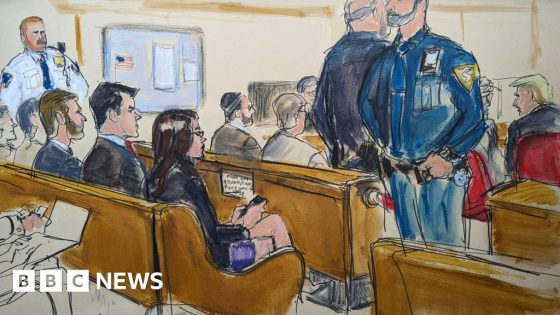Phil McCausland, reporting from New York,BBC News
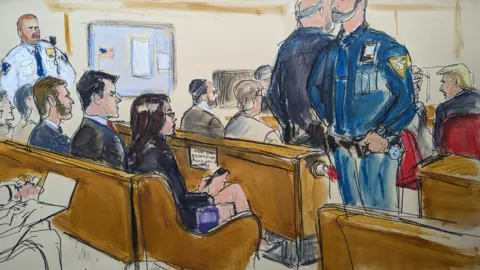 Elizabeth Williams
Elizabeth WilliamsIt is only through their deft hands and keen eyes that the world gets a peek into the courtroom where Donald Trump’s hush-money trial is being held.
With cameras banned during the proceedings, sketch artists have been essential for allowing the public to see images from the first criminal trial of a former US president.
Settling into the third row each day, the courtroom sketch artists bring their supplies – oil pastels, pencils, charcoal sticks, mixed media paper, plus seat cushions – to watch hours of testimony and courtroom arguments.
“It’s Trump, so I never have had as much media coverage in my life. I’ve covered high-profile cases – those are the only ones sketch artists get hired for – but every single day (media organisations across the world) use my sketches,” said Jane Rosenberg, an artist covering the hush-money trial.
BBC News spoke with Ms Rosenberg and Elizabeth Williams, courtroom artists since the 1980s, who both have attended each day of the trial.
They have drawn at all kinds of trials, including New York mafiosos’ and Martha Stewart’s, throughout their lengthy careers.
Ms Rosenberg’s approach is to draw an amalgamation of moments, while Ms Williams is restricted to drawing exact scenes.
“I really feel devoted to it, to draw the actual scene, because it allows people to really see what’s happening,” said Ms Williams, who worked as a fashion illustrator in Los Angeles before testing her hand at courtroom drama.
But this case, they said, is different.
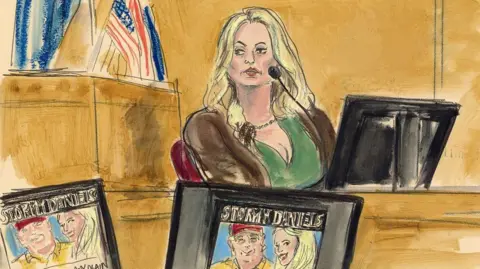 Elizabeth Williams
Elizabeth WilliamsMr Trump’s name and time in the White House brings layers of extra security, rules and logistics to the proceedings.
“I’ve never had as much tight security restricting my movements – even going to the bathroom. It’s really difficult to get in, get a seat and get set up,” said Ms Rosenberg, who studied fine art portraiture before working as a courtroom artist.
The women said they line up each morning at 7:00 local time (12:00 BST) lugging their supplies. When they are allowed into court, generally about two hours later, they quickly set up before Mr Trump and his entourage arrive.
In the past, they’ve had a front row seat, but prosecutors and the defence have reserved the first two rows for their own purposes.
Ms Williams recalled how David Pecker, an ex-tabloid publisher who testified, brought a group of lawyers who were particular obstacles.
“They all had the biggest heads and they were the tallest men,” she said with a laugh. “It was like, really? You couldn’t sit in another row or something?”
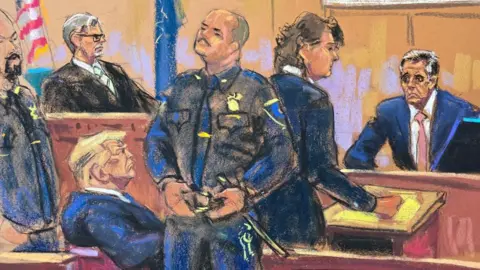 Reuters
ReutersRelegated to the third row, the women said they crane their necks around court guards standing in the front and Mr Trump’s frequent guests to get a good angle of him, the witnesses, Justice Juan Merchan and the lawyers.
Mr Trump has come to recognise Ms Rosenberg, who has attended many of his legal proceedings, including various civil trials.
Some days he mouths a greeting at her. In the past, he has even given her feedback.
“During the Trump civil fraud trial, he had to walk right past me, and he would stop and look over his shoulder and say, ‘Oh, I need to lose some weight’ or ‘Really amazing work.’”
Both artists said the scramble to deliver on deadline is a challenge. Phone use is not allowed in the courtroom, and those inside are not allowed to leave when they want.
That means they can only deliver their work during breaks.
The artists said they typically prop sketches on a trash can in a court bathroom to get decent light then shoot them with cell phones.
“It’s the most bizarre thing, but that’s what happens,” Ms Williams said. “It’s the need for speed and lighting – that’s key.”
“And we don’t have time to leave. You could miss something, and you can’t miss anything.”
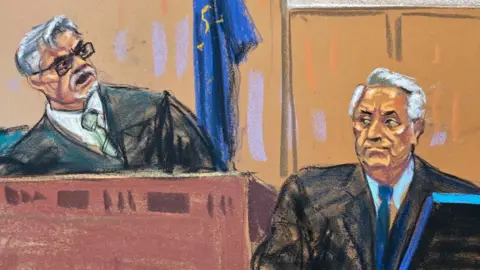 Reuters
ReutersDelivering the work is important, they said, because their work is the only way for the public to gain access to a courtroom that requires an hours-long wait in line to attend.
Ms Rosenberg said she takes that responsibility very seriously.
“It’s a public service,” she said. “But I do enjoy it. Instead of being an artist at home in my little cabin, getting cabin fever and not having a single soul in the world, I get out there and it’s an adrenaline rush.”
Because of this case’s intensity and increasingly confined space, Ms Rosenberg said she invented new tools and contraptions to make life easier, including a shelf for her binoculars and a pen holder made of a paper towel holder.
But neither woman is willing to predict the outcome, despite sitting through each day.
Ms Williams said she can “never predict the verdict’’.
“I suck at it, and I’m always wrong,” she said. “Every jury is different.”
But they both plan to attend what is expected to be the final week of the case, and will be there until the final day of Mr Trump’s trial.
“It’s fun and it’s odd – I don’t know – at this point I’m waiting for my invitation to Mar-a-Lago,” Ms Rosenberg said with a laugh.
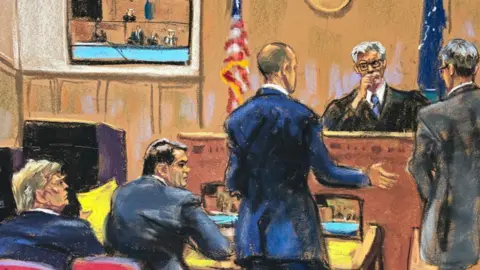 Reuters
Reuters
Source Agencies

